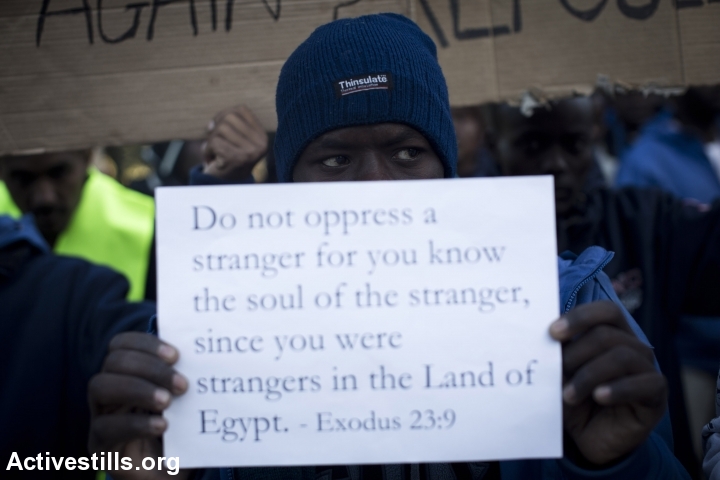T’ruah: The Rabbinic Call for Human Rights today praised the courageous non-violent acts of civil disobedience carried out by indefinitely detained African asylum seekers in Israel. Some 150 Sudanese asylum seekers staged a walk out of Israel’s new Holot “open” internment camp on Sunday and marched from the southwest Negev to Jerusalem in protest of Israel’s new “Anti-Infiltration” Law.
The “March for Freedom” ended with the arrest of all of the asylum seekers who participated in peaceful demonstrations in front of the Prime Minister’s Office and the Knesset on Tuesday. These protesters were transferred to the Saharonim closed detention facility where they were be held for three months before being eligible to return to the Holot internment camp.
The March for Freedom particinats, along with hundreds of other asylum seekers who remained behind in Holot, are participating in a hunger strike to protest of their indefinite dentition.
“These asylum seekers are following a long-held Jewish tradition of non-violent civil disobedience,” said Joshua Bloom, T’ruah’s Director of Israel Programs. “That tradition stretches from the Hebrew midwives Shifrah and Puah, to American civil rights leaders like Rabbi Abraham Joshua Heschel, and continues on through present-day.”
T’ruah recently denounced the Israeli Government’s new “Anti-Infiltration” Law that the Knesset passed in the early morning hours of December 10, International Human Rights Day.
The law raises serious questions about compliance with a recent Israeli High Court of Justice decision. In September, the High Court ruled that detaining asylum seekers without trial for a minimum of three years violates Israel’s Basic Law on Human Dignity and Liberty, and it set a December 15 deadline for when 1,750 asylum seekers and migrants must be individually examined for release. Prior to the passage of the new law, Israeli authorities released fewer than 700 asylum seekers from detention.
“Some have tried to justify the forced detention of asylum seekers, many of whom have suffered persecution and abuse in their home countries, by characterizing Africans as criminals, infiltrators, or threats to the Jewish character of the state,” said Rabbi Jill Jacobs, Executive Director of T’ruah. “But the true threat to the Jewish character of the state is the government’s abandonment of the Jewish imperative of care for the gerim–the landless sojourners who seek refuge among us.”
When the new law came into effect on December 12, hundreds of African detainees were transferred to a fenced-in “open facility” in relatively isolated area of Holot Halutza in the Negev. The law allows for the government to round up thousands of other African asylum seekers and hold them in internment camps. According to the law, these individuals will be required to report in three times a day and they will be locked in at night, to prevent work or flight, and there will be no limit on the length of residence.
There are approximately 55,000 asylum seekers in Israel. Most of these individuals are from Eritrea and Sudan which they fled because of repressive regimes, conflict, or forced conscription. Tens of thousands of these asylum seekers were kidnapped, tortured, and held for ransom by human traffickers in the Sinai desert before they secured their freedom and made it to Israel.

